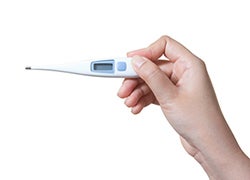Ebola Virus: What to Know

WakeMed Health & Hospitals is fully prepared to face and manage the Ebola virus should an infected patient enter any of our facilities. We follow direct and current guidance from the Centers for Disease Control & Prevention (CDC) and the World Health Organization (WHO). Our staff continues to undergo training on how to use the appropriate protective equipment, and we follow the CDC- and WHO-recommended patient care protocols and processes necessary for Ebola (learn more about ebola training and preparedness). This includes asking in-depth questions (i.e. travel history) of any patient who is suspected to be sick with the virus. WakeMed is also well-equipped with the appropriate protective gear for staff.
Throughout the WakeMed system, the Ebola virus remains high on our radar. Our staff is well-aware of the virus’ behavior and mode of transmission, and we have the tools and protocols in place to help prevent and combat the spread of this illness.
Transmission
The Ebola virus is only transmitted through direct contact with the bodily secretions of an infected person, living or dead. Bodily secretions include, but are not limited to, vomit, blood, sweat, breast milk, saliva, urine and feces. Ebola is not transmitted through the air, but it can live on surfaces for several days.
The incubation period of Ebola is two to 21 days. A key point to remember is that an infected person is not capable of transmitting or shedding the virus until they show symptoms.
Signs & Symptoms
Signs and symptoms of Ebola include:
- Fever
- Headache
- Muscle pain
- Weakness
- Diarrhea
- Vomiting
- Abdominal pain
- Hemorrhage
Prevention
When considering any virus, it is important to use the following methods of infection prevention:
- Frequent hand washing with warm water and soap
- Frequent use of alcohol hand gel
- Controlling/containing secretions (i.e. throwing away used tissues)
- Avoid contact with any person who is sick and stay home if you are sick
Additionally, most household cleaners and bleach can be used to kill the Ebola virus on surfaces.
What to Do if You Suspect You or Someone You Know has Ebola
If you suspect that you or someone that you know might have Ebola, it is important to first ask these questions:
- Has this person traveled to an Ebola outbreak country within the last 21 days (Guinea, Sierra Leone or Liberia)?
- Does the person have symptoms including a fever of more than 101.5 degrees in addition to one or more of the symptoms listed above?
If the answer to these questions is yes, call your medical provider and let them know about your concerns regarding an Ebola infection. They will instruct you on what to do next. Reference this webpage from the N.C. Department of Health & Human Services for further information. Or call the Ebola Public Information Line:
1-800-222-1222
Additional Ebola Resources
For more education and information about the Ebola virus visit:
CDC on Ebola:
- Main page: http://www.cdc.gov/vhf/ebola/
- Infographic from site: http://www.cdc.gov/vhf/ebola/pdf/infographic.pdf
- Latest CDC outbreak info (current case counts, map of areas affected): http://www.cdc.gov/vhf/ebola/outbreaks/2014-west-africa/index.html
- CDC Ebola factsheet: http://www.cdc.gov/vhf/ebola/pdf/ebola-factsheet.pdf
WHO on Ebola:
- Main page: http://www.who.int/csr/disease/ebola/en/
- Global Alert and Response Situation Reports (current WHO ebola information):
Ebola on CDC Twitter:
-
http://www.cdc.gov/features/twitterchat/
CDC Twitter: @CDCgov – Through this Twitter feed, one can see regular up-to-date announcements and statements from CDC officials and the CDC director.